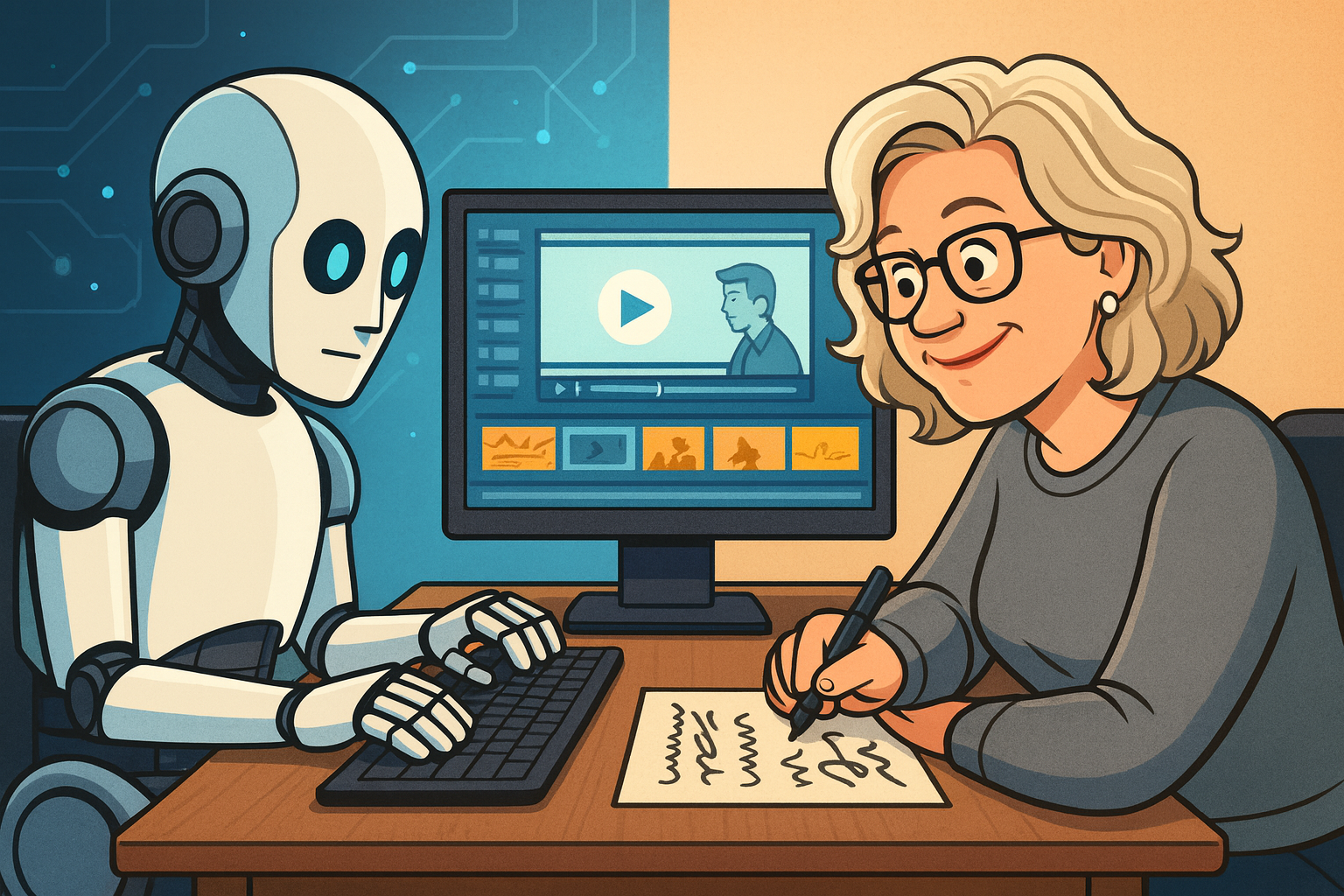A.I. Didn’t Steal My Job, But It Did Try to Write My Sizzle Reel
Is there an AI app that can create a new speaker reel for me? I was curious.
Now, before you start asking questions—I am indeed a television producer. I was an editor for years, and putting together a reel is an easy job. But it’s not easy to put together a sizzler that features me. I’ve made great strides in body acceptance and personal celebration, but not enough to stare at my face for days on end.
Back to the search. I found a few AI platforms offering a variety of services. The instructions were all the same: upload your videos, tell us what you want, and behold—a reel!
I decided to check out some of the samples. They were fine. Not great. Not horrible. Just... fine.
Then I noticed something else: they were all structured the same way.
Now, this isn’t uncommon. All film trailers—and most narratives—follow the same skeletal structure:
Provocative opening hook
Overview
Character tease
Highlights to engage without giving away the whole story
Provocative closing hook
Total running time: 2 minutes, 23 seconds
So the structure didn’t surprise me. What struck me was that each person felt the same. They had the same emotional drive, tone, familiar offerings, etc. None of them stood out. They felt the same.
🎬 Flashback Time
Albert Finney starred in the 1991 low-budget thriller Looker. The plot was your typical murder mystery: a group of elite fashion models turns up dead, and the only connection between them is the same plastic surgeon. Who is killing these beautiful women?
It was written and directed by the late Michael Crichton. It’s not great cinema, but the theme is frighteningly prescient. And honestly, it’s hard for anything starring Albert Finney to be truly awful, and that includes Wolfen.
What I remember most from the film is that all the models were chasing perfection. Their faces were aligned in perfect symmetry, down to the millimeter. Perfection meant identical. And the models who tried to undo their surgeries? They ended up dead.
The perfect specimens had to remain.
Think about that. The idea that uniformity is the ideal, and that technology can manufacture perfection.
Things that are not perfect: Van Gogh’s paintings. Beethoven’s symphonies. Many of the supermodels in George Michael’s Freedom! video. Pedro Pascal’s gorgeous face.
It’s the imperfections—the unique, messy details—that make art (and people) beautiful, memorable, and human.
(Side note: that iconic Freedom! music video was directed by David Fincher of Fight Club and The Girl With the Dragon Tattoo fame.)
💡 The Real Problem with AI Reels
That’s what bugged me about the AI-generated reels. They were perfectly adequate—but they lacked originality, personality, and community.
A sizzle reel should sell the person—their storytelling, creativity, and voice. If every reel is the same, then what makes you unique?
Remember: what you’re selling is yourself, your talent, and your individuality.
🤖 AI Is a Tool, Not a Replacement
AI diminishes your uniqueness if you use it as a solution and not as a tool. It’s a tool—just like Photoshop or Pro Tools.
No matter how many virtual actresses or uncanny, dead-eyed animations it creates, AI cannot (and should not) replace human creativity. Programs like ChatGPT or Grok may make processes more efficient, but what they churn out is average.
Don’t believe me? Let’s go to MIT’s Sloan School of Management. I love this bite:
“We deliberately don’t call these [human skills] ‘soft’ skills,” said Rigobon. “A ‘hard’ skill, like solving a math problem, is comparatively easy to teach. It is much harder to teach a person these critical human skills and capabilities—such as hope, empathy, and creativity.”
Human skills aren’t “extras.” They’re the foundation of innovation and authentic storytelling. They create the geniuses who give us masterpieces like Parasite, Andor, and The Life of a Showgirl.
🎤 The Takeaway
Don’t undervalue what you bring to the table. You bring something unique—like Cindy Crawford’s mole or, frankly, everything about Pedro Pascal.
Don’t let AI reduce you to the average—because you, my friend, are anything but average.
You’re special.

